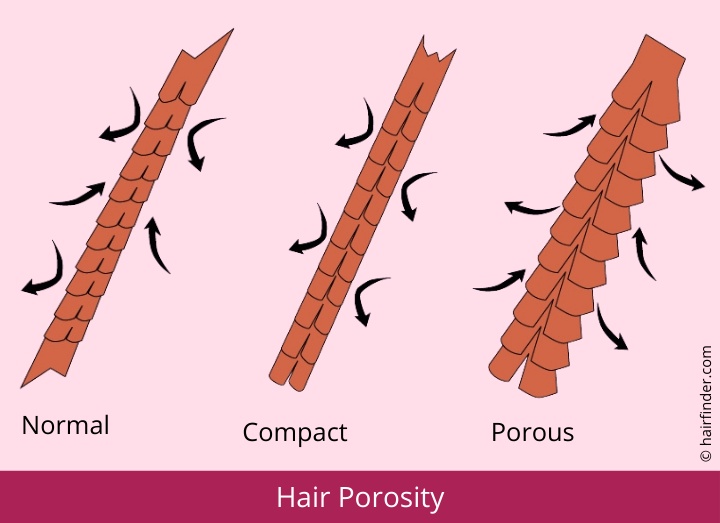As a frequent poster on several of the major hair boards, this is a question that often comes up. What’s the difference between regular conditioner and deep conditioner? A lot of people say that it’s just the length of time that you leave the conditioner on your hair that determines if it is “deep” or not. Others say that you can add stuff “oils/butters/humectants” to a regular conditioner to get the effects of a deep conditioner. In my opinion, to actually be able to answer that question, you have to delve a bit deeper into the science of hair, specifically the structure of the actual hair.
Each hair has three layers: the medulla at the center, which is soft; the cortex, which surrounds the medulla and is the main part of the hair and makes up the majority of the hair shaft; and the cuticle, the hard outer layer that protects the shaft. The cuticle is formed by tightly packed scales in an overlapping structure similar to roof shingles. On hair that is in optimal condition, the scales on the cuticle lie flat and are tightly packed.
Here is a diagram that I found that best show what I'm describing
Most conditioners that we encounter/use are not deep conditioners (yes, even if they say they are) and are really rinse out conditioners. Regular/rinse out conditioners can only coat the hair regardless of how long you let it sit on your hair. In order for a conditioner to be considered a deep conditioner, it must be either used with heat (which opens up the cuticles of the hair and allows for penetration of the ingredients) or it must contain various oils/ingredients that naturally penetrate the hair shaft. Most deep conditioners use both (penetrative ingredients AND advise the application of a heat source).

For the most part, baring excessive chemical damage, the cuticle of most people is mostly closed (or as closed as is normal for your hair). The exception to this would be individuals with highly porous hair, in which the scales on the cuticle are naturally raised (see this article for more info). So….what causes the cuticle to open up and allow for the penetration of the conditioning agents (as apposed to causing the cuticle to open and cause damage)? Indirect heat (from a hooded dryer, steamer, hot towel and or sauna) is probably your best source. Personally, I don’t think that enough heat/steam is generated from your bathroom shower to significantly open up the cuticle and allow penetration of conditioning agents.
So…what ingredients are naturally able to penetrate the hair shaft? Well, the ingredient that can penetrate the hair shaft most is….WATER! In addition to water, some oils have been proven to penetrate the hair shaft. Oils that can penetrate the hair shaft include:
- Coconut oil, being a triglyceride of lauric acid (principal fatty acid), has a high affinity for hair proteins and, because of its low molecular weight and straight linear chain, is able to penetrate inside the hair shaft.
- Coconut Oil, Avocado Oil, Olive oil penetrate the hair shaft to make it stronger (J. Cosmet.Sci 52, 169-184, 2001)
In addition to these natural oils, there are other ingredients that have been proven to penetrate the hair shaft and provide a conditioning effect namely:
- Henna and henna extracts, specifically the lawsone molecule that is responsible for the red dying effect of henna, has an affinity for keratin and protein. This molecule is able to penetrate the hair shaft and impart color, while also providing conditioning effects.
- Panthenol is the only vitamin (Vitamin B5) known to penetrate the hair shaft. It has historically been used to build healthy follicles and reduce graying.
- Hydrolyzed Keratin Proteins are the basic building blocks of the hair shaft.
While these ingredients to my knowledge haven’t been proven to penetrate the hair shaft, they are essential in many other ways to overall hair/scalp health
- Aloe Leaf Extract provides building blocks for proteins and is a soothing anti-inflammatory that protects against environmental damages to the hair and scalp.
- Dimethyl Sulfoxide is used to facilitate absorption of key ingredients into the scalp and follicles.
- Linoleic Acid is a fatty acid that is necessary for the growth of healthy hair follicles.
- Tocopherol Acetate (Vitamin E) is a known anti-oxidant for skin and scalp and helps promote red blood cell count.
- Cetyl Trimethyl Ammonium Chloride is used to emulsify all of the ingredients and can soften, soothe and condition the scalp.
- Glycerin is a naturally derived fatty component that absorbs water to naturally moisturize the hair shaft and root.
- Silica is an important mineral that helps the body form collagen, which is instrumental to promoting strong, healthy hair.
Please keep in mind that deep conditioners can be either protein or moisture based, so you have to read the ingredient list to see which one it is. And just because a product says it's a deep conditioner doesn't mean it actually is. Look at the ingredient list and the directions. If it doesn't involve heat or says something about penetrating the hair, it probably isn't a good deep conditioner.
Related Posts : Deep conditioner,
Taking care of natural hair


7 comments:
Way to break it down girl! 2 thumbs up on this post =)
Wow, this was SUPER helpful man!! GREAT advice. Do you know if any of the other ayurvedic herbs penetrate the hair, or just henna? I hope I'm not doing amla pastes thinking I'm conditioning but not... :(
hummmmmmm..i didn't really do a search on the ayurvedic herbs...but that' an idea for another topic. I'll start reseaching and post on that soon!
This post was very helpful!
Great post! Very helpful.
does castor oil penetrate the hair shaft like olive oil?
This was very useful. You mention that some conditioners are moisturizing while others are for protein. can you tell me what ingredient to look out for in each category?thanks!
Post a Comment